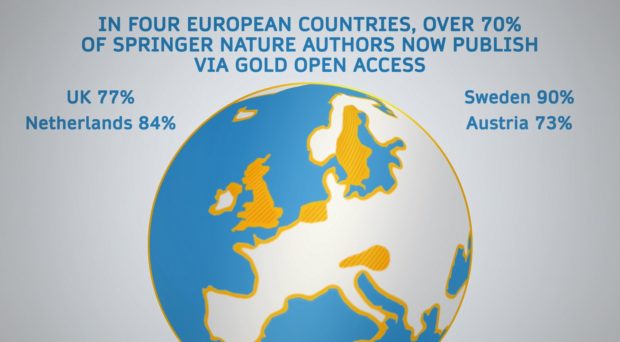
At the start of 2017 Open Access Week, today we’re delighted to announce that we have reached a significant milestone in advancing discovery through open research. In four European countries, over 70% of Springer Nature’s journal articles are being immediately published (gold) open access.
This includes:
- Over 77% of corresponding authors based in the UK
- Over 90% of corresponding authors based in Sweden
- Over 84% of corresponding authors based in the Netherlands
- Over 73% of corresponding authors based in Austria
The rise of open access as a publishing model is not surprising, because the benefits are clear. Today globally, 27% of all research published by Springer Nature is now published under an immediate gold open access model. Most of this is in pure OA journals but in the four countries above increased hybrid OA take-up means offsetting is occurring there while more generally more article growth is being funded outside of library budgets.
This is good, but it can and should be better. We will continue to strive to make it so. Why? Because we believe that open approaches benefit the whole scientific and research community, facilitate collaboration, aid the application of research to solve real-world problems, and foster economic growth, increase the public’s appreciation of research and in summary, advance discovery.
What might be surprising is the scale of this achievement in the four markets listed above, which has been made possible through a unique environment, with four key factors in the recipe for success:
- Support from governments and institutions who back open access
- Funders who fund APCs
- Authors who are willing to publish via open access
- A publisher providing authors with a wide range of attractive publishing options
….together they make the transition to open access a reality.
Springer Nature has a long history of innovation across journals, books, and databases, our publishing platforms and ways in which content can be discovered, used, re-used and shared by humans and machines. Of course at the same time we believe in academic freedom and respect author choice, so we will continue to offer a range of traditional models for as long as there is demand, and indeed today many of these continue to be the most widely used in our portfolio.*
But we’ve now developed and offer open access options for authors at all levels (via BMC, Springer, Nature Research and Palgrave Macmillan) and across all disciplines. We’ve also taken risks by flipping some of our best-known journals to open models (for example Nature Communications) and will continue to push the boundaries with our fast-developing open access books program and new open data and data management services.
We now publish 630 fully open access journals, and over 1800 Springer Open Choice (hybrid) journals. All of the countries where we have achieved this phenomenal result are where we have Compact agreements. Compact offers our partners significantly more value and reduces their administrative burden by taking a holistic approach and combining their local Publishing Fees with their global Access/Reading Fees, facilitating the transition that we are trying hard to support.
Liam Earney, Director of Jisc Collections said: “Since its launch in 2016, the Springer Compact agreement has seen an almost complete flip in the number of articles from UK authors made open access instead of paywalled in Springer journals. This growth has only been possible because of the work done by colleagues at Jisc, Springer Nature and most importantly institutions to review and improve the workflow for institutions and authors and the efforts made to ensure that the Springer Compact agreement was affordable and sustainable.”
As a result, we are now uniquely placed among publishers to show it is possible to ‘flip’ entire countries, not just journals.
It wouldn’t work in every country, nor will it work in every discipline (not yet anyway) but we are making progress. We are on a journey, from traditional publishing methods to open access, open research, and beyond. But we can’t succeed alone. We’re calling for the research community, from funders to institutions, authors and editors to partner with us in making that happen.
We’re open in order to advance discovery. Will you join us?
*We continue to extend access to our subscription-only titles via our Springer Nature SharedIt content-sharing initiative, which provides authors and subscribers with shareable links to view-only versions of their published papers; via our liberal self-archiving policy, which permits authors to self-archive their accepted manuscript from shortly after first online publication; and through our collaboration with the Research4Life programme to provide access to institutions in low-income countries.
Comments